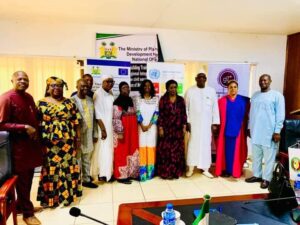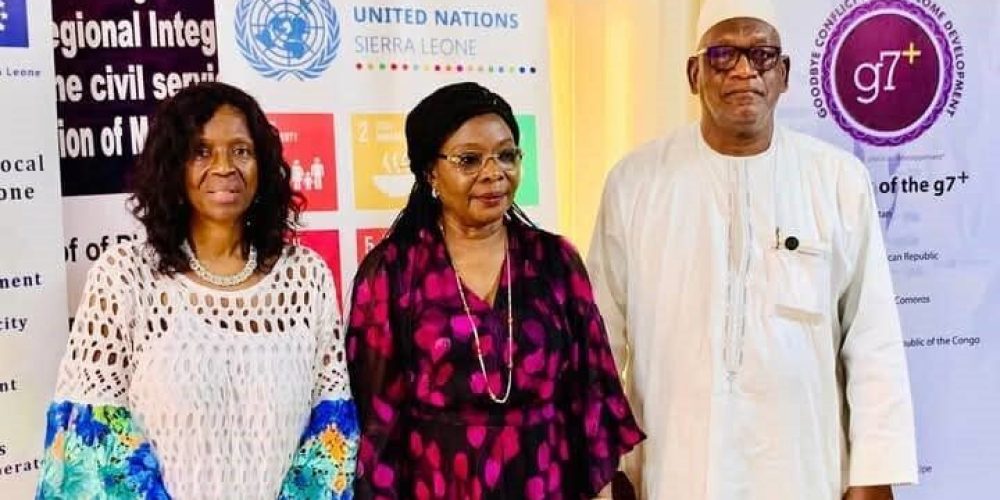Planning and Economic Development Minister Madam Kenyeh Barlay, the ECOWAS Commissioner for Human Development and Social Affairs, Professor Fatou Sow Sarr, and ECOWAS Resident Representative Ambassador Harouna Moussa just after the meeting
The Economic Community of West African States (ECOWAS) Commission has reaffirmed its commitment to women’s empowerment in Sierra Leone through the establishment of a factory for reusable sanitary pad production in the Kono and Moyamba Districts. The initiative, spearheaded by the Commissioner for Human Development and Social Affairs, Professor Fatou Sow Sarr, was the focus of a high-level engagement with the Minister of Planning and Economic Development, Madam Kenyeh Barlay, the ministry’s Conference Hall in Freetown.
The proposed factories aim to address critical health and social issues affecting women and girls, including access to affordable sanitary products for schoolgirls and support for women suffering from obstetric fistula and incontinence. This project aligns with ECOWAS’s broader mission to promote gender equality and improve women’s health across the region.
During the meeting, Professor Fatou Sow Sarr emphasized ECOWAS’s ongoing commitment to supporting Sierra Leone through development initiatives facilitated by the Ministry of Planning and Economic Development (MoPED). She highlighted that the project represents a tangible step toward addressing pressing gender issues while also contributing to regional development.
Minister Kenyeh Barlay, in her remarks, expressed Sierra Leone’s appreciation for ECOWAS’s intervention and reaffirmed the government’s commitment to partnering on this transformative initiative. She noted that the project aligns seamlessly with the Medium-Term National Development Plan (MTNDP) 2024–2030, particularly under the Big Five Game Changers framework, which prioritizes human capital development.
The Minister also highlighted the project’s potential to advance youth empowerment by creating jobs and boosting local economies. She acknowledged ECOWAS’s visibility in Sierra Leone and applauded its previous support, including efforts on border projects, logistics depots, and joint border posts.
Peter Sam-Kpakra, Development Secretary at MoPED, in his welcome remarks, highlighted the critical role ECOWAS Commission continues to play in promoting sustainable development in Sierra Leone and the subregion. He mentioned tangible development done by ECOWAS in Sierra Leone. He appreciated the team for choosing Sierra Leone for such a project.
Salomata Thim, Principal Gender Program Officer at the ECOWAS Gender Development Center, stressed the need for innovative approaches to ensure the success of the project. She outlined plans to engage Sierra Leone, Côte d’Ivoire, and Senegal as key stakeholders, while ECOWAS continues to guide policies for women’s empowerment.

Minister Barlay and others members of the MOPED team with the ECOWAS Commission delegation
Isatu Conteh Njai, Acting Director of the Gender Division, underscored the long-term benefits of the sanitary pad factory, particularly for rural women and fistula patients. She expressed optimism that the project would not only improve women’s access to sanitary products but also create employment opportunities, especially for young people. Njai noted that a steering committee has been established to oversee legal, procurement, and gender-sensitive frameworks critical to the project’s implementation, in alignment with ECOWAS’s 50th Anniversary agenda.
The ECOWAS delegation outlined key next steps for the project, including site identification, procurement processes, and the finalization of a Memorandum of Understanding. The project is expected to foster collaboration among ministries, development partners, and stakeholders to ensure its successful implementation.
As Sierra Leone gears up for the ECOWAS 50th Anniversary celebrations, the sanitary pad production project stands as a beacon of progress, addressing critical issues of women’s health, youth employment, and regional development. Minister Barlay concluded the meeting with gratitude to ECOWAS and reiterated MoPED’s readiness to lead and support the initiative for the betterment of Sierra Leone’s women and girls.
The delegation included high-ranking officials from the ECOWAS Commission, the ECOWAS Gender Development Center (EGDC), the West African Health Organization (WAHO), and the ECOWAS Resident Representative in Sierra Leone other key partners committed to the success of the initiative.





